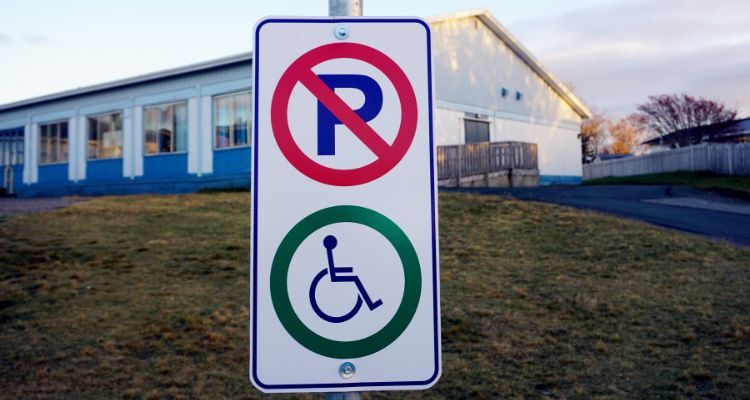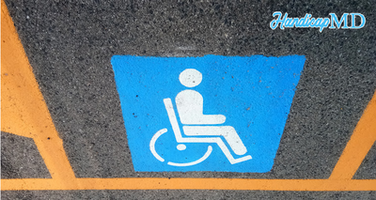
Unveiling the Rules and Regulations of Using a Handicap Placard in Arkansas
Navigating public spaces can be a challenge for individuals with disabilities, but disability parking tags provide a much-needed solution for improved accessibility. In AR, as in many other states, the disability tag, also known as a pass or permit, grants individuals with qualifying disabilities access to designated parking spaces. These spaces, located close to building entrances, offer increased convenience, reduced walking distances, and easier access to public facilities.
However, to fully benefit from a disability tag, it’s important to understand the specific rules and regulations that govern its use in AR. In this comprehensive guide, we’ll dive deep into the requirements, benefits, responsibilities, rules and regulations associated with using a handicap placard in Arkansas. We’ll also explore how to apply for one, avoid common mistakes, and ensure that you’re complying with state laws to avoid fines or penalties.
What is a Handicap Placard in Arkansas?
Definition and Purpose
A disability tag in AR, often referred to as a disability placard or permit, is a special parking authorization issued by the Arkansas Department of Finance and Administration (DFA). It allows individuals with qualifying disabilities to park in designated disabled-accessible parking spaces. These spaces are often wider, allowing for the use of mobility devices like wheelchairs or walkers, and are typically located closer to building entrances.
The primary purpose of the disability tag is to make transportation and daily tasks easier for individuals who have difficulty walking or who suffer from conditions that limit their mobility. By reducing the physical strain and minimizing the distance between their vehicle and their destination, these parking accommodations are essential to ensuring that public spaces are accessible to all.
Types of Disability Tags Available
In AR, there are several types of handicap permits available to cater to different needs:
- Permanent Disability Tag: Issued to individuals with long-term or permanent disabilities.
- Temporary Disability Tag: Designed for individuals with temporary disabilities or conditions expected to last less than six months.
- Disabled Veteran Plates: Available to veterans with service-connected disabilities, offering a distinct license plate with the International Symbol of Access.
- Special Disability License Plates: These license plates feature the universal symbol for disability and are affixed to the vehicle in place of a traditional plate.
Eligibility Criteria for a Handicap Placard in Arkansas
Physical Disabilities
To be eligible for a disability tag in AR, individuals must have a qualifying condition that significantly impairs their ability to walk or move. The state defines a qualifying disability as one that limits an individual’s mobility, such as:
- Inability to walk 200 feet without stopping to rest.
- Severe lung disease that affects normal oxygenation or lung capacity.
- Cardiac conditions classified as Class III or IV by the American Heart Association.
- Arthritic, neurological, or orthopedic conditions that severely limit mobility.
- Dependent use of a wheelchair, walker, cane, or other assistive devices.
Medical Conditions
In addition to physical disabilities, certain medical conditions that impair mobility may also qualify an individual for a disability tag. These conditions may include:
- Severe respiratory conditions that require the use of portable oxygen.
- Certain neurological disorders that affect motor skills or mobility.
- Severe degenerative diseases like multiple sclerosis or muscular dystrophy.
A healthcare provider must certify that the applicant has a condition that meets the eligibility criteria set forth by the AR DFA before the tag can be issued.
How to Apply for a Handicap Placard in Arkansas
Required Documentation
To apply for a disability tag in AR, you’ll need to submit a completed application form (Form 10-366) to the AR Department of Finance and Administration. The form requires information about the applicant, including:
- Full name, address, and contact information.
- The type of tag or license plate being requested (permanent or temporary).
- A signed medical certification from a licensed healthcare provider that verifies the applicant’s qualifying disability.
Step-by-Step Application Process
- Download the Application: The application form (Form 10-366) can be downloaded from the AR DFA website or picked up in person at a DFA office.
- Medical Certification: Have your healthcare provider complete the portion of the form that certifies your qualifying disability.
- Submit the Application: Once completed, the form can be submitted by mail or in person at a local DFA Revenue Office.
- Processing Time: The DFA typically processes applications within 7 to 10 business days, after which you will receive your tag or license plate by mail.
Fees Associated with Application
While there is no fee for a permanent or temporary disability tag in AR, individuals opting for a disability license plate may be required to pay the standard vehicle registration fees.
How to Properly Use a Disabled Permit
Displaying the Tag Correctly
When using a disability tag in AR, it is crucial to display it correctly to avoid fines or penalties. The tag should be hung from the rearview mirror while the vehicle is parked in a designated disability parking space. If your vehicle does not have a rearview mirror, the tag can be placed on the dashboard in a clearly visible location.
It’s important to note that the tag must be removed when the vehicle is in motion to avoid obstructing the driver’s view.
Parking in Designated Spaces
The disability tag grants access to parking spaces specifically marked for individuals with disabilities. These spaces are usually located near entrances of public buildings, shopping centers, medical facilities, and other high-traffic areas. They are identified by the International Symbol of Access (wheelchair symbol) and blue paint.
When parking in these spaces, ensure that your disability tag is visible and that you are not blocking any access ramps or van-accessible areas, which are designed for vehicles equipped with wheelchair lifts.
Common Misuses and Legal Consequences
Misusing a disability tag is a serious offense in AR and can result in steep fines and even the revocation of the tag. Common misuses include:
- Using someone else’s disability tag: The tag is only valid when the person to whom it was issued is present in the vehicle. Using another person’s disability tag, even if they are a relative, is illegal.
- Using an expired or invalid tag: Tags must be renewed before their expiration date. Using an expired pass may lead to fines or penalties.
- Failing to display the tag properly: The tag must be clearly visible while parked. Failing to display it correctly can result in a fine or ticket.
Rules for Parking with a Handicap Placard
Where You Can Park
With a disability tag, individuals can park in any designated disability parking space in AR. These spaces are typically located in public and private parking lots, near building entrances, and in high-traffic areas.
However, a disability tag does not grant permission to park in restricted areas such as:
- No-parking zones (e.g., fire lanes or loading zones).
- Spaces reserved for specific uses, like commercial vehicles or electric car charging stations (unless the vehicle also meets those specific criteria).
- On sidewalks or crosswalks, even with a disability tag.
Exemptions from Certain Parking Laws
AR law provides some exemptions for disability tag holders:
- Parking at meters: Individuals with a disability tag or plate are generally allowed to park at metered spaces without paying the fee, but time limits still apply in most cases.
- Residential parking zones: Some local municipalities offer exemptions for disability tag holders in residential parking zones, but it’s important to verify the specific regulations in your area.
Time Limits for Parking
While disability tag holders may be exempt from certain parking restrictions, they are still subject to time limits in many cases. For instance, parking in metered spaces without paying is permitted, but the posted time limit for the spot must still be followed. Be sure to read any signs or notices in the area to avoid violations.
Renewing and Replacing Your Disabled Permit
Renewal Process
Permanent disability tags in AR must be renewed every four years, while temporary tags are valid for up to six months. The renewal process is straightforward:
- Check Expiration: The expiration date is clearly printed on your tag. Be sure to renew before the expiration date to avoid interruptions in parking privileges.
- Complete Renewal Form: You will need to submit a new medical certification from your healthcare provider for each renewal, along with a completed renewal form.
- Submit by Mail or In-Person: The renewal application can be submitted by mail or in-person at a local DFA office.
How to Replace a Lost or Stolen Tag
If your disability tag is lost, stolen, or damaged, you can request a replacement by submitting a new application form to the AR DFA. You will need to provide a signed statement explaining the circumstances of the loss or theft.
There is no fee to replace a lost or stolen disability tag.
Penalties for Misusing a Disabled Permit
Consequences of Misuse
Misusing a disability tag in AR carries serious penalties. Fines can range from $100 to $500, and repeated offenses may result in the suspension or revocation of the tag. Common forms of misuse include:
- Using a tag issued to another person.
- Using a fraudulent or counterfeit tag.
- Parking in a disability space without properly displaying the tag.
Legal Repercussions for Fraudulent Use
Fraudulent use of a disability tag, including the production or use of counterfeit tags, is a criminal offense in AR. In addition to fines, individuals caught engaging in fraudulent behavior may face misdemeanor or felony charges, depending on the severity of the offense.
Special Considerations for Handicap Placards
Temporary Tags for Short-Term Disabilities
AR offers temporary disability tags for individuals with short-term disabilities, such as those recovering from surgery or injury. Temporary tags are valid for a maximum of six months, after which they must be returned to the DFA or renewed if the disability persists.
Disabled Veteran Plates
Disabled veterans in AR may apply for a special disabled veteran license plate if they have a service-connected disability. These plates provide the same parking privileges as other disability tags but also honor the individual’s military service.
To qualify for a disabled veteran plate, individuals must provide documentation from the Department of Veterans Affairs (VA) verifying their service-connected disability status.
Traveling with a Disabled Permit
Using an Arkansas Disability Tag Out-of-State
Under the Americans with Disabilities Act (ADA), Arkansas disabled permits are generally recognized in other states. However, each state may have slightly different rules regarding time limits, metered parking, and enforcement. It’s always a good idea to familiarize yourself with local laws when traveling out of state.
International Travel with a Disability Tag
While the AR disability tag is valid across the U.S., international recognition of disability tags varies from country to country. If you plan to travel abroad, contact the embassy or consulate of the destination country to learn about their accessibility laws and whether your disability tag will be honored.
Challenges and Common Issues Faced by Disabled Permit Holders
Dealing with Inaccessible Spaces
One of the biggest challenges faced by individuals with disability tags is finding available and accessible parking spaces. In crowded areas or during peak times, designated spaces may be occupied, making it difficult to find parking close to your destination.
In these situations:
- Arrive Early: Planning ahead and arriving early can help increase the likelihood of finding an available spot.
- Explore Alternative Options: Some locations offer valet services or reserved parking for individuals with disabilities. Check if these options are available.
Reporting Violations or Abuse
Another common issue is the misuse of disabled parking spaces by individuals without a disability tag. If you notice someone illegally parked in a designated disability space:
- Document the Violation: Take note of the vehicle’s make, model, and license plate number.
- Contact Local Authorities: Report the violation to local law enforcement or parking enforcement, providing them with the necessary details.
How to Report Abuse or Fraudulent Use of Disabled Permits
Contacting Law Enforcement
If you witness someone misusing a handicap placard or parking in a designated space without a tag, you can report the violation to local law enforcement. Provide details such as the location, vehicle description, and nature of the violation. In many cases, law enforcement officers can issue citations or fines on the spot.
The Role of the AR Department of Finance and Administration
The AR Department of Finance and Administration (DFA) is responsible for issuing and regulating disability tags in the state. If you suspect fraud or have concerns about the misuse of a disability tag, you can also report the issue to the DFA for investigation.
Accessibility Improvements in AR
Government Efforts to Expand Accessible Parking
In recent years, the AR state government has made efforts to improve accessibility in public spaces by increasing the number of designated disability parking spaces and enforcing stricter regulations on their use. These efforts aim to ensure that individuals with disabilities can access public spaces with greater ease and convenience.
Advocacy Groups Supporting Disability Rights
Several advocacy groups in AR work to protect and promote the rights of individuals with disabilities, including the right to accessible parking. Organizations like Disability Rights Arkansas and the Arkansas Independent Living Council provide resources, support, and advocacy for individuals facing accessibility challenges.
Frequently Asked Questions (FAQs)
Who is Eligible for a Disability Tag in AR?
Individuals with permanent or temporary disabilities that impair their ability to walk or cause other mobility issues are eligible for a disability tag in AR. Eligibility must be certified by a licensed healthcare provider.
Can I Use My Disability Tag in Other States?
Yes, AR disability tags are recognized in other states under the ADA. However, it’s important to familiarize yourself with local parking laws when traveling out of state.
How Do I Report Someone Misusing a Disability Parking Space?
To report someone misusing a disability parking space, contact local law enforcement and provide details about the vehicle and location. You can also report violations to the AR DFA.
What is the Difference Between Permanent and Temporary Disability Tags?
Permanent disability tags are issued to individuals with long-term or permanent disabilities, while temporary tags are issued for short-term conditions lasting less than six months.
Are There Any Fees Associated with Applying for a Disability Tag?
There are no fees for applying for a permanent or temporary disability tag in AR. However, individuals applying for a disability license plate may be required to pay standard vehicle registration fees.
How Long Does it Take to Get a Disability Tag in AR?
The AR DFA typically processes applications within 7 to 10 business days. Once approved, your disability tag will be mailed to you.
Conclusion
Using a disability tag can significantly improve the daily lives of individuals with mobility challenges by offering easier access to public spaces and parking. However, understanding the rules, regulations, and responsibilities associated with these handicap placards in Arkansas is essential for avoiding fines and ensuring that the system remains fair and functional for all who need it.
By following the guidelines for applying, using, and renewing your disability tag, as well as reporting violations when necessary, you can make the most of your disability tag and navigate AR with greater ease and confidence. Remember, a disability tag is more than just a parking permit—it’s a tool that empowers individuals with disabilities to maintain independence and access essential services without unnecessary barriers.
.png)






